They/them. Hindublr & Langblr. Connoisseur of mytho shows. Sponsored by incorrectmahabharatquotes
Don't wanna be here? Send us removal request.
Text
This Valentine's week, I want us all to remember the only couple ever that mattered- The Yaoi Generals from Jarasandha's army.
Truly, no one else was doing it like them. Romeo and Juliet who? I only know Hansa and Dimbhaka.
-Mod S
46 notes
·
View notes
Text
WIP Tag Game
ok so the fantastic @sharngpani tagged me and yes, I’m so sorry for forgetting about this for months.
Trinity series : So basically a million headcanons and my interpretation of mythology patchworked into storylines focusing on Vishnu, Lakshmi, Shiva, Parvati, Saraswati and Brahma. •Currently working on my Vishnu/Lakshmi fic. Set during original timeline. • I aim to explain world building, different aspects of Hindu mythology, how the gods became who they are, backstories…the whole deal.
LakshmiNarayan more or less adopt the parentless kids who come their way. Prahlad, Dhruv, Shani, to some extent…yup.
Trinity Modern AU fics
Dwarka royal family fics : Snapshots of Krishna and his family. He is a good father and a good husband and I will fight you on this.
Mohini x Lakshmi oneshots
Luv, Kush and Ram : Post Sita’s ascension. Seeping in angst. They’re trying. He’s trying.
Ram and Sita one shots : Set throughout the Ramayana. Ram is NOT a chauvinistic pig in these, for the folks who like that sort of thing.
Kartikeya and Shiva fic : Set after he leaves. more father and son angst yay can you see a pattern oh and I’m tagging @desikanya
20 notes
·
View notes
Text
RATING EVERYTHING I'VE READ ABOUT THE MAHABHARAT(INCLUDES DNF)
The Navneet Mahabharat for Kids: 11/10, it did things to my brain and got me into the mahabharat in the first place. Have you SEEN the shikhandi in it?
13th day: 6.5/10 for the angst, 4 points taken off for the unnecessary yudhishthir POV and I think the author exaggerated on the abhimanyu POV a little bit sooooo. But ig it was necessary to provide exposition. There is this one conversation between bheeshma and karna which is just. really uh. thought provoking and interesting. Cis shikhandi warrants another point taken off, but she is actually so awesome that im gonna give half a point back. Also one more thing about 13th day I love is how ABHIMANYU IS SHOWN TO HAVE THE 'i gotta kill my family' CONFLICT IN IT BECAUSE HE HAS TRAINED WITH PEOPLE IN THE NARAYANI SENA. It's very blink-it and you miss it but it's Interesting. Krishna is a footnote(which, true, krishna and arjun being away from the battlefield and not being able to save abhimanyu is the whole point of that story and I found it really funny how yudhishthir was like. "Arjun's charioteer Krishna")
The Broken Sun: 8/10 the next book in that series, broken sun is the sequel to 13th day and covers arjun's vow to drona's death. I really loved bheem, ghatotkach, and the arjun POV and this book's insistence on solely referring to Karna as radheya. One point taken off for Slight Misogyny(ON THE AUTHORS PART. IM NOT TAKING POINTS OFF FOR PERIOD TYPICAL STUFF), and another point taken off for That Poop Scene.
Yuganta: 8.5/10, you clocked the Krishnarjun very accurately, mam, but I did not really like constant uh. comparisons? yeah. And the period typical touch of victim blaming. But you did shut down some other researchers that blame draupadi for things so. yeah points for that too ig. It is an awesome and well-researched book tho pls pls go read it.
The Aryavarta Chronicles Book 1: Govinda: 7/10. Points taken off for some of the weird sing-songy shit, the WMDs, and cis shikhandi. But shikhandi is very cool so like. 2 of the 7 points are because of that. And the firstborn-firewright thing which was so confusing it made me stop reading. DNF but I might go back for the awesome characterizations of everyone. Author matches my freak wrt not liking arjun that much.
Mrityunjay: 9/10, one point taken off because the prologue says this book is gonna be in "simplelanguage that everyone understands" but then shivaji sawant writes like everyone has swallowed a thesaurus. DNF because the marathi font was sans serif. If I manage to get it in a devnagri font easier on my eyes I will read it. It's just an well written book from a guy who was very excited about his blorbo and I respect that!!
Draupadi: 9/10, one point taken off for a take about satyavati I disagree with, but the rest of the book is so juicy and delicious. Aruna Dhere is COOKING and I want to meet her please and thank you.
Madhyamavyayoga: 10/10, actually. Bhasa, sir, I would like to invite you to tumblr for your hot takes and how clear it is that abhimanyu is your blorbo.
Pancharatra: 10/10. Well-written what-if by a guy who is excited about his blorbos. I respect that. btw his blorbos are bheem, abhimanyu, and karna.
Karnabharam: 8/10 because I had to study this in 9th grade(and that too in the midst of covid and my mental health going to shit) and it ruined it for me a little bit but hey I love it. Props for naming your work "Karna's issues". Sometime I might post the
On my list, haven't read these yet but I plan to:
Radheya, Ranjit Desai
Rashmirathi, Ramdhari Sinha Dinkar
Vyasaparva, Durga Bhagwat
Pandava Quintet, Roshni Chokshi
Yugandhar, Shivaji Sawant
Mysticism in the bhagwat gita
Mahabharat by NC Panda
At least a children's book edition of the mahabharat in marathi. Need to interact with the mahabharat in marathi more
Karna the sanskrit hero of the epic mahabharata: Kevin Mcgrath
Urubhanga
And any other interesting books I come across.
52 notes
·
View notes
Text
Shri’s absolutely a sugar mom/buddy/whatever to the people she loves. Narayan? Doesn’t even need to ask, just let his gaze linger on a particularly fine sketchbook and it’s delivered wrapped in silk to his lap before he has a chance to forget about it. Need an oven for his latest experiment? State of the art piece sitting on the counter. Begs him to let her take him somewhere exotic because yes, they need a goddamn vacation. Dinner overlooking the Niagara Falls? A private cruise on the Pacific? Uninterrupted nights in Paris? Parvati? Once complained about never being able to book the dance studio for a performance and Shri bought her and Shiva the place as a wedding gift. Saraswati’s had her eye on a special edition being sold in an exclusive auction? Here it is, and all Saraswati did was look it up briefly in front of her.
55 notes
·
View notes
Text
Chhoti si chiraiyya- part 3
'दे विदाई में तुझे क्या कीमती सामान
When he held Shrutkarma's body Arjun was no longer a person. He had to be supported by Bheem to even stay standing. The sorrow and shame almost crushed him and the Gandiv almost slipped from his hand. Pulling out one of the golden embellishments on the famed bow, Arjun put that piece of gold into the fire.
देजा निन्दियाँ रेन की
Draupadi had nightmares every night.
When she slept, the noise of war greeted her, and when she awoke, it was the deathly silence of the mourners.
When she was not able to sleep at night, she worked. Her eyes watered while reading under the dim light of the lamp, but she kept at it. Nakul shouldn't have to bear the workload alone AND look after Madra on the side.
While working, she dozed off, papers scattered around her head like a halo.
In her dream, a girl and a boy played in a meadow. They laughed as they chased each other, the laughter lapsing into giggles when she was finally able to catch him and tackle him to the ground. After a few minutes of wrestling, he got up and ran towards the flowerbeds. The gardener yelled at them, but what could he say to the prince and princess? The actual king may rule over the land but these two ruled over everyone's hearts. His yells faded into the background as the prince got her flowers and put them into her hair. Draupadi smiled, and ran her hands through the grass.
"Come on, I think they've finished building the swing! You wanted to see it, right?"
"Yeah, Ushna, let's go!"
She ran to the swing and sat down.
"But there's only one swing! What about you?" she asked.
"You know, Jitu and I used to do this, back when we were young," Shikhandi interrupted. "Dhrishtadyumna, stand behind her. That way, there's space for you both on the swing."
Dhrishtadyumna narrowed his eyes, but did as he said, and soon, they were up, up, high in the air, and they were soaring, and everything felt so, so good and happy.
Then the branch snapped and she was- she was falling, and
falling
falling
falling
Draupadi woke up with a start at the sound of the snap.
Her dream would be just that, a dream. Dhrishtadyumna and her would never get another chance at life, at being kids. They would never be able to play like that, with abandon and innocence and-
Later, when Bheem found her, tear stains dotted the expense reports. it seemed she had cried herself to sleep. He carried her to bed and tucked her in, not staying around for when she would inevitably be woken up because of yet another nightmare.
He wasn't strong enough.
सुबहों की ले मुस्कान
It took days, months, even, for Sahadev to tell Arjun the truth.
He hadn't broached the subject at first, avoided the subject when Arjun asked.
"You aren't asking for much, father. Just the truth. It keeps you up at night to not know." Uttaraa said to Arjun as he fidgeted with the edge of Parikshit's blanket. "It's not wrong to want to know,"
"He doesn't say anything when I try to ask him. Every time he dodges the question!" Arjun replied.
"It makes me upset to even think about it! You will be asking him to recount something ugly, and horrible, and- so, so gruesome! No wonder he doesn't want to talk!" she has
"Just now you were saying it wasn't wrong for me to want to know what happened!"
"Oh, it isn't! I am trying to say that this isn't black and white. Ask him, but if he doesn't tell you, accept his answer. That's all you can do,"
Arjun's smile slid off his face like water off a duck's back. When had Uttaraa grown so mature? Where had the girl who asked for the kuru warriors' clothes for her dolls gone? There seemed to be a chasm between them, and Uttaraa, who was so attached to him and would talk Brihannala's ear off, was suddenly so, so withdrawn and barely spent time near him.
He didn't know that every time she looked at him, Uttaraa saw not her father-in-law, but her father, his eye socket spurting blood, his face contorted in pain, and his slashed chest unable to be stitched up. She had love, and her mother and aunts and mothers-in-law fathers-in-law tried their best, and she was so, so grateful, but it felt like there was a gaping hole in her heart that felt like it would never be filled.
भरके अपनी चोंच में
Sahadev gripped the handle of his chair in a vice-like grip when telling Arjun what had happened.
Draupadi was silent, a hand on his knee as his face grew paler and paler as he told them.
Vindhya's head, rolling on the ground. Sutasoma's thighs. Shrutakarma's neck. Shrutasen's arms.
And-
And shatanik.
And when talking about the war, Nakul was usually nowhere to be found.
But that was all they had, now, stories. All they could do was keep talking, keep remembering. Sometimes, talking made them feel better, sometimes it left them unable to speak for
लेजा हमरे प्राण
Her twin had been suffocated with a pillow, she heard. Sometimes, she too, reached up for her neck and face and tried to fight off an invisible foe, only to realize that the pain was some sort of phantom pain, haunting her. There were days when she wished she hadn't forgiven the killer.
Manu and Uttam, pummeled to death.
Shalaka vahini, perhaps the only one who went out in a blaze of glory that night, protecting her husband until her last breath.
And her eldest brother? Tortured and left for dead, but she didn't know who had it better.
छोटी सी चिरैया छोटी सी चिरैया'
There were no two people whose thought processes were alike, that was true enough.
But on that final journey, five people did share one thought.
And their last thought on that mountain, as they fell, was this:
Finally.
22 notes
·
View notes
Text
Marathi Rukmini Jewellery Breakdown
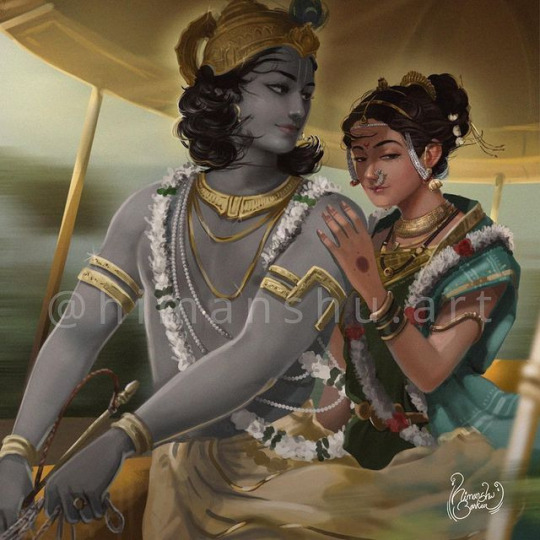
Ok so I found this art of Krishna and Rukmini by Himanshu Bankar where rukmini is shown in marathi traditional attire and it made me SO SO HAPPY to see that because she's rarely depicted like that! And thenI saw it being shared on tumblr by a lot of ppl who didn't know that whatever clothes/jewellery rukmini is wearing is traditional marathi bridal attire.
So I thought I'd do a deep dive into this painting and talk about her clothes, hair, and jewellery! This is a long post, imma put everything under the cut! Tagging @cyndaquillt because you asking me about marathi miku made me learn a lot more about marathi jewellery, @sharngapani for showing me this image in the first place, and @chahaa-piun-ja for cheering me on!
Hair:
Her bun is a hairstyle called "Khopa" (खोपा) and the gold pin in her hair is called a Juda(जुडा). These can either be gold pins or have strings of pearls attached to them and I'm thinking that the latter is what she is wearing. Then the maang tika is pretty standard across cultures. The golden band between the maang tika and the juda is called a Bijwara(बिजवरा) and it's not used much in the modern day so I did have to do a bit of research to find out what it was.
Images, from left to right: Khopa, juda, and a minimalist maang tika/bindi.
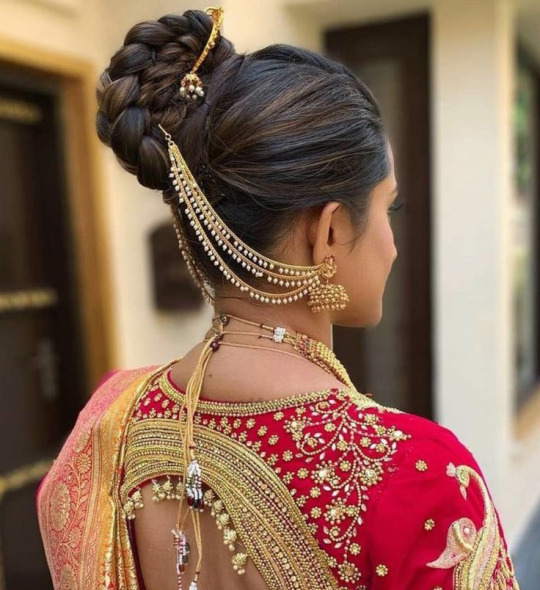
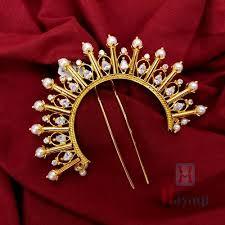
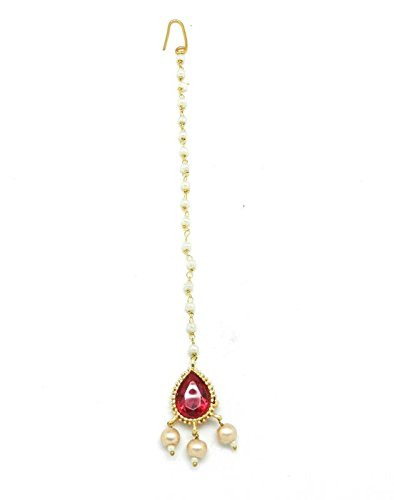
Face
On her forehead, and hanging on either side of her face are Mundavalya(मुंडावळ्या), a forehead ornament worn by Maharashtrian brides & grooms. It is made from pearl & has two pearls strings which stand for the togetherness of bride & groom. Chandrakor is actually my ABSOLUTE fave part about maharashtrian culture it's the crescent moon on her forehead. Then on her nose is a pearl Nath(नथ). She's also wearing Kanpatti(कानपट्टी) aka ear strips on her ears and they're attached to her normal earrings. Fun fact btw the kanpatti in her ears looks a lot like the one my mom has.
Images from left to right: mundavalya+chandrakor, nath, kanpatti(without earrings)
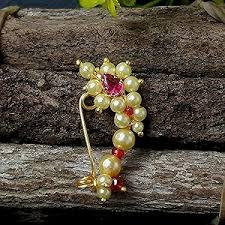


Neck:
Generally what I've seen people wear at their fanciest is three-four necklaces, one right at the throat, one slightly lower, and a couple hanging almost down to mid-chest or upper stomach. Rukmini in that drawing is following that pattern. The choker-style necklace she's wearing in the picture isn't super clear but I think it's a thushi(ठुशी). It is a choker necklace crafted out of gold beads in varying sizes and is adjustable thanks to a soft thread that can be adjusted according to the wearer’s convenience. The next one seems to be a plain golden chain but the fact that she's wearing a mangalsutra at the time Krishna is taking her away is icing on top!
Thushi, mangalsutra and mohanmal in the picture below!
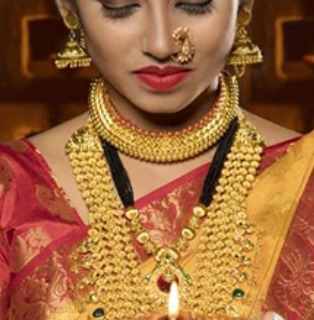
Arms:
There is a shela around her shoulders. These are generally made of silk and worn by brides.
Rukmini is wearing a vaki(वाकी) or bajuband(बाजूबंद).
Maharashtrian women generally wear green glass bangles(I've heard north indians wear red ones someone pls confirm this), and for weddings and festivities they're layered with gold bangles. Today, for everday wear, some people wear only one golden bangle on each arm(like my mom) or they might wear glass bangles(my grandma does this), and only do the gold-glass layering during special occassions.
The names of these bangles differ according to the way they're made and where they're placed on the layering. The thickest gold bangles nearest to the hand are called Tode(तोडे) and they're pair of heavy gold bangles that feature intricate designs that go all around the bangle. Since they keep the layering in place, they're generally smaller than the actual wrist and include a screw and hinge to fasten them. The gold bangles in the middle and back are called Patlya(पाटल्या), are a type of traditional gold bangles and are often decorated with intricate designs on the outside.
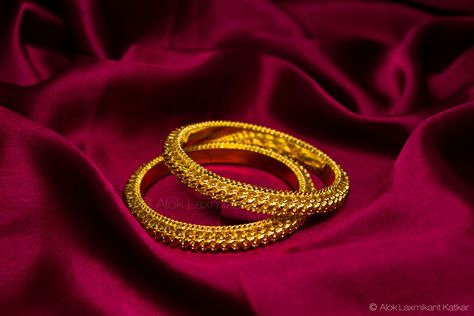
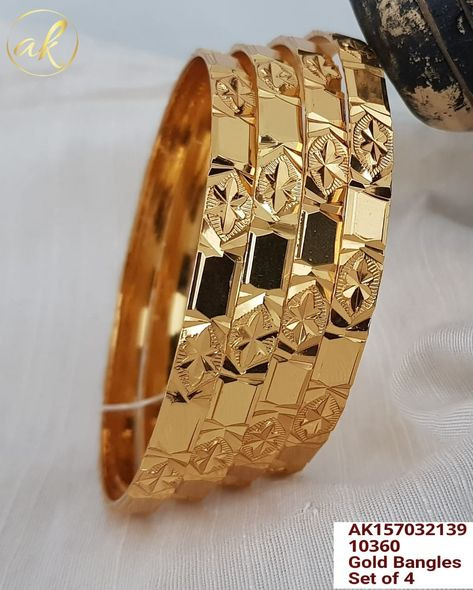
#mahabharat#krishna#rukmini#hindublr#kanpatti is also a thing in tamil jewellery! my grandma wore one for a long time
103 notes
·
View notes
Text
Chhoti si chiraiyya- Part 1
छोटी सी चिरैया छोटी सी चिरैया
Nakul scatters stale food into the pond where the ducks are creating a ruckus. A duckling struggles to swim, and is helped along by it's mother. What did they know of the war? What did they know of all the destruction it wrought, of all the death it brought? It's a bright winter morning, more than three years after the war, and he can still remember the night, a few years ago, when Shatanik, wearing short clothes of soft cotton, bare chested as if it was summer, had seen him bundled up under so much cloth that his face was barely visible and begun laughing.
His son loves loved winter so, so much, the cold never seemed to bother him. Whenever he trained, his spear piercing through the morning fog made him look almost... divine, he always asked the cooks or draupadi or bheem or sutasoma what was cooking, always eager to taste the new ways they had found to prepare the wealth of produce that winter offered. But no matter how much he was skilled, no matter how much he poked fun at Nakul, no matter how much he outshined him in both looks and personality, no matter how much he took after his mother, he would always be Nakul's little... duckling.
Almost hurriedly, he threw the rest of the food, and the earthen bowl with which it came into the pond and rushed inside, calling for Udit to bring him his paperwork.
उड़के चली किस गाँव
Shahadev's hands shook on the balcony railing. It was dusk, birds flying to their roosts at the end of the day, and months ago, they were on a balcony not dissimilar to this one when Shrutasen had admitted the reason he hadn't talked much with him. His child barely remembered him. He admitted, though, that he too had changed in the last thirteen years. It wasn't a parent and a child standing in front of each other that day, but two strangers.
Almost like two actors who had never met before being asked by the director to act out the roles of a father and son in a play. They would forever remain like that, wouldn't they? Sahadev had seen what lied in Shrutasen's destiny the moment he was born, and he had tried to avoid getting attached, but now, all he could do was mourn what could have been instead of what was. Everyone else might have had memories, but he had only possibilities to ponder upon and what ifs to wonder about.
People envied his steady hands, but all they could do after the war was shake and shake and shake as he tried to remember the child and tried to stop remembering the grown-up.
रेह गया दाना रेह गया पानी
Food tasted like sand to Bheem. He couldn't enter the kitchen without getting reminded of raucous laughter and quiet smiles and the contrasts between his two sons. Sutasoma had taken the surprise of an elder brother in stride and Ghatotkach revelled in another younger brother to dote over. One day, he had walked into the kitchen to see sutasoma on his eldest brother's shoulders, trying to get a jar from the highest shelf, both of them laughing loudly.
Sutasoma had promised to visit him in the forest sometime. He had promised.....
सूनी भई अमवा की छाओं
Ghatotkach was born under a tree, it's branches spreading wide, creating a huge, shady canopy. His first child was born on a day with a mild breeze and his cry made bheem feel like the world had burst into colours.
How was he going to tell Hidimba?
What was he going to tell hidimba?
And how was he going to face Arjun? Whom would he have chosen, if the choice rested with him, he wondered. It kept him up at night.
The sun beat down on his back but he couldn't stand in the shade. The cool breeze of the summer would wrap around him like a hug, warm currents circled him in winter, but even his father could not comfort him.
मुनिया मोरी
Sahadev finally broke down that night, regrets about not letting himself get close to Shrutasen, regrets about not trying hard enough, regrets all coming to a head...
No matter how much he tried to hold himself up, he failed. He was brought down to his knees by the weight of his knowledge and regret and sobbed.
25 notes
·
View notes
Text
Chhoti Si Chiraiyya- part 2
अज़ब निराली मोह की माया समझे समझ नहीं आये
How many kingdoms did he have to raze before he could finally rest, subhadra wondered. What was the need for another Ashwamedha Yajna? What was the need for more war, more destruction, more loss and more death?
She never understood how her brother, who in one breath said that one must escape from worldly trappings, could espouse even more conquest and bloodshed with another.
Hadn't they lost enough?
अंगना से तोहरी चहक तो जाए
A flock of birds chirped noisily outside his window while he worked. When had he last heard Prativindhya's voice chirping just like those birds outside of his window? When was the last time someone had excitedly rushed into his room, saying "Baba, baba-!"
Yudhishthir had lost his son long before he died.
When was the last time there had been anything but bitterness between them?
Yudhishthir missed his son, and he thought he could endure a thousand words that cut like poisoned daggers, only if he could hear his son's voice again.
He would take all the shouting, all the caustic insults over this deafening silence.
तोहरी महक नहीं जाए
Prativindhya had expensive tastes, and when yudhishthir met him again, even if Prativindhya wasn't allowing him to come closer, the smell of attar or musk would always emanate from him even from afar. After all, he was yojanagandha's son. At points when vindhya was feeling particularly angry, Yudhishthir would use his own sense of smell to stay out of vindhya's way.
How he wished he had sought him out instead of avoiding him, how he wished he had tried to apologize and repent. He wished he had tried to bridge the chasm between them, but-
But wishes didn't do anything, and all he could do was live out his days and hope whatever came after would be kind, he hoped that whatever he was born as in his next life, his son didn't have a father like him.
नैन समंदर सात भरे पर
Arjun tried not to think much these days. If he thought, he would feel, if he felt, he would collapse, and he could not collapse. He was a commander on a conquest and collapsing would mean death, or worse, defeat. It was as simple as that.
But- but wasn't Shrutakarma at the very back of his mind even when he was alive?
Didn't getting distracted and not thinking about how his sons were doing kill them?
So he thought. He thought about how they were as opposite as men's thoughts and words, he thought about Shrutakarma's quietness and Abhimanyu's loudness, of Shrutakarma's hesitance and Abhimanyu's confidence.
How Shrutakarma often went unnoticed, behind the scenes, and Abhimanyu was always in the spotlight, blazing and burning until-
Until he flew too close to the sun.
No, no, that wasn't right. That made it seem like his death was his own fault.
It wasn't.
It was Arjun's wasn't it.
He took Susharman's bait, he allowed himself to be led away from the battlefield, he-
And after he thought they had won the war, he allowed himself to relax, he had a good night's sleep before losing it forever.
Arjun stared at himself in the lake near the campsite, his face haggard, his eyes bloodshot from the sleepless nights, and tried to cry, but he felt so exahusted. As if his tears had dried up and his eyes were tired from all the crying and- and he couldn't cry.
If he could, he thought, his tears would have made another lake right next to this one and then gone on to fill the seven seas.
भरे ना करेजवा के घाव
He had not been fair to Shrutakarma, he thought. He shouldn't have said that to Shrutakarma when he checked up on him after Saubhadra died.
Shrutakarma's shattered face when Shikhandi told him that his injured hand meant that he probably would never be able to draw or write still haunted him.
And that fact was made all the more prominent when, in a fit of rage, Nakul had shouted at him,
"You weren't the one who reminded him to keep water aside for himself, and not give it all to the horses, you weren't the one who wiped his tears after his brothers, yes, I mean Panchal's princes because he grew up with them, were killed by your beloved guru, you weren't the one who found him asleep standing up FREQUENTLY, you- what is wrong with you? You had the most remarkable son in all the three worlds, why were you never there for him?"
मुनिया मोरी
He asked that question to himself all the time. What was wrong with him? Why could he never understand Shrutakarma?
Shrutakarma had been blunt, though, never one to mince words. Had he been alive, maybe he could have answered that question.
Nakul had apologized later, of course, but it didn't change the fact that he had spoken the truth.
@blackknight-100 @theramblergal @archpoet77 @ishaaron-ishaaron-me @magica124 @sharngapani @rishabhaa @cyndaquillt
14 notes
·
View notes
Text
"The best translations into English do not, in fact, read as if they were originally written in English. The English words are arranged in such a way that the reader sees a glimpse of another culture’s patterns of thinking, hears an echo of another language’s rhythms and cadences, and feels a tremor of another people’s gestures and movements."
— Ken Liu, Translator’s Postface to The Three-Body Problem
8K notes
·
View notes
Text
Shri : Hi! I’m Shri and this is my husband Narayan and that’s his husband Shiva and that’s his wife Parvati
40 notes
·
View notes
Text



Pandu's warmonger arc in IMQ server rewatch of B R Chopra's Mahabharat
(credit to @sharngapani for inspiring two of these)
6 notes
·
View notes
Text
The kind of Vaishnavism that I like the most has to be the neo-Vaishnavite/Ekasarana Dharma movement in Assam led by Xrimonto Xonkordev (Srimanta Sankardev). Why? Cuz:
1. It is openly anti-caste/varna and anti-Brahminical Hinduism. (There are a few denominations that can be considered exceptions though)
2. Xonkordev translated the major Hindu scriptures and epics to Assamese and shared them openly to the people of the lower castes and marginalized groups.
3. Monastries (Xotros/Satras) that were set up by him are governed and controlled by non-Brahmin priests (Xotraadhikaris) (Dokkhinpat Xotro is probably an exception rn cuz as far as I'm aware it's a Brahmin Vaishnav who runs it currently. Not sure tho)
4. One of the denominations, the Kala Sanghati, is known for incorporating several tribal and socially oppressed groups into this neo-Vaishnavite movement. This denomination was one of the most vocally anti-monarchist groups and hence led the famous Moamoria rebellion against the Ahom royalty.
5. This last point is personal to Assamese culture mostly, to which this movement, and especially Xonkordev, contributed generously through his composed borgeets (devotional songs), ghuxas (poetic works, and Naam Ghuxa and Rotnovoli were composed by his pupil, Madhovdev), social revolution against casteism and consolidating all ethnicities and religions (including Islam) into his movement.
Now there were indeed several problematic practices in this movement here and there, as is the case of any religious movement, but it is still one of the most persisting unorthodox, non-Brahminical sects of Hinduism till date.
31 notes
·
View notes
Text
A convo with @ishaaron-ishaaron-me reminded me of this one thing I had cut from my Dhrishtadyumna character study, it was about how dhrishtadyumna and draupadi perceive themselves and each other. And also THANK YOU SO MUCH @sharngapani for giving me this idea
Dhrishtadyumna, who is like "I'm a living weapon, I destroy everything I touch and I'm unloveable and no one likes me" at the start of his character arc sees himself as a forest fire left unchecked, destroying everything and as a harbringer of death and all.
Draupadi sees him as the fire of a hearth. The fire of home. A warm campfire on a cold night. He is comfort, he is home.
Draupadi, at the beginning of her character arc, sees herself as a panti, a lone flicker of light in the window that can be blown out by a whiff of wind at any moment.
Dhrishtadyumna sees her as a panti too, but one in front of the altar, calm and steady and devoted and something to be cherished.
At the end of their arcs I'm just using a lot of yajnakunda symbolism for both of them because well. Do I have to make it any more obvious? you'll see how it all plays out
17 notes
·
View notes
Note
*fixing the mic*
*holding it like some interviewer*
Some words for those who think Indra is a BIG. BAD. womaniser and villain?
(im just seeing too much of this shit ok and it's so L :p)
Tata-
*clears throat*
I can go on a whole ass rant but I'll keep it as concise as possible.
Indra being flawed is the very thing that makes him... HIM. It's the very thing than makes him INDRA. His weaknesses, his bad decisions, everything. Also nobody in the entire Hindu pantheon is perfect (yes, not even your beloved Vishnu/Krishna/Shiva, etc. Bite me :3). Literally all the gods are flawed. In fact, many of the gods can, in fact, be considered... womanizers... if we're considering Indra one.
He is definitely not the villain. He's a king, and a king sometimes abuses his powers. A king might get greedy at times, and at times he might throw a fit, and make bad decisions. A king can be stupid sometimes, and silly.
"Oh he has lost so many battles against other Gods he's so weak"
That's because all the texts he's lost battles in are either in favor of the Gods who are winning, or just complex stories like that. Read the Rig Veda, which was written in favor of him, and he's the strongest one in there (alongside Agni). However, I'm not saying he can't lose a battle. All I'm saying is that Hindu texts are biased. They're like fanfics of authors with a favorite God, and in those texts, that favorite God is portrayed the most powerful. Simple as that. Same goes for the Rig Veda. It was biased towards Indra and Agni mostly, but at least it wasn't as biased as some of the later texts (*bombastic side eye*)
All in all, idc if anyone gets offended, but literally no deity in the Hindu pantheon is perfect, morally or on any other basis (if you think anyone is perfect it's fine, you do you, but remember that your personal belief isn't canon for the whole of Hinduism). Indra is one of those imperfect Gods. And that's why we love him. Because perfection is boring (to me, at least).
Maybe my fellow Indraites can also deliver some words regarding this topic - @inc0rrectmyths @hydestudixs
34 notes
·
View notes


